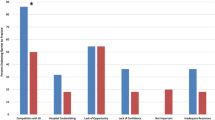Abstract
Background
The purpose of this study was to assess the adequacy of current surgical residency and gastroenterology (GI) fellowship flexible endoscopy training as measured by performance on the FES examination.
Methods
Fifth-year general surgery residents and GI fellows across six institutions were invited to participate. All general surgery residents had met ACGME/ABS case volume requirements as well as additional institution-specific requirements for endoscopy. All participants completed FES testing at the end of their respective academic year. Procedure volumes were obtained from ACGME case logs. Curricular components for each specialty and institution were recorded.
Results
Forty-eight (28 surgery and 20 GI) trainees completed the examination. Average case numbers for residents were 76 ± 26 colonoscopies and 45 ± 12 EGDs. Among GI fellows, PGY4 s (N = 10) reported 99 ± 64 colonoscopies and 147 ± 79 EGDs. PGY5 s (N = 3) reported 462 ± 307 colonoscopies and 411 ± 260 EGDs. PGY6 GI fellows (N = 7) reported 515 ± 111 colonoscopies and 418 ± 146 EGDs. The overall pass rate for all participants was 75 %, with 68 % of residents and 85 % of fellows passing both the cognitive and skills components. For surgery residents, pass rates were 75 % for manual skills and 85.7 % for cognitive. On the skills examination, Task 2 (loop reduction) was associated with the lowest performance. Skills scores correlated with both colonoscopy (r = 0.46, p < 0.001) and EGD experience (r = 0.46, p < 0.001). Receiver operating characteristics curves were examined among the resident cohort. The minimum number of total cases associated with passing the FES skills component was 103. Significant variability existed in curricular components across institutions.
Discussion
These data suggest that current flexible endoscopy training may not be sufficient for all trainees to pass the examination. Implementing additional components of the FEC may prove beneficial in achieving more uniform pass rates on the FES examination.
Similar content being viewed by others
References
Valentine RJ, Jones A, Biester TW, Cogbill TH, Borman KR, Rhodes RS (2011) General surgery workloads and practice patterns in the United States, 2007–2009: a 10-year update from the American Board of Surgery. Ann Surg 254:520–525
Halverson AL, Hughes TG, Borgstrom DC, Sachdeva AK, DaRosa DA, Hoyt DB (2013) What surgical skills rural surgeons need to master. J Am Coll Surg 217:919–923
Nimeri AA, Hussein SA, Panzeter E et al (2005) The economic impact of incorporating flexible endoscopy into a community general surgery practice. Surg Endosc 19:702–704
Malangoni MA, Biester TW, Jones AT, Klingensmith ME, Lewis FR (2013) Operative experience of surgery residents: trends and challenges. J Surg Educ 70:783–788
Mehran A, Jaffe P, Efron J (2003) et al Colonoscopy: why are general surgeons being excluded? Surg Endosc 17:1971–1973
Hazey JW, Marks JM, Mellinger JD et al (2014) Why fundamentals of endoscopic surgery (FES)? Surg Endosc 28:701–703
Gardner AK, Willis RE, Dunkin BJ et al (2015) What do residents need to be competent laparoscopic and endoscopic surgeons? Surg Endosc. doi:10.1007/s00464-015-4597-8
Fonseca AL, Reddy V, Yoo PS, Gusberg RJ, Longo WE (2016) Senior surgical resident confidence in performing flexible endoscopy: what can we do differently? J Surg Educ 73(2):311–316. doi:10.1016/j.jsurg.2015.09.014.
Subhas G, Gupta A, Mittal VK (2010) Necessity for improvement in endoscopy training during surgical residency. Am J Surg 199:331–334
Flexible Endoscopy Curriculum (2015) http://www.absurgery.org/default.jsp?certgsqe_fec. Accessed 29 Jan 2015
SAGES Fundamentals of Endoscopic Surgery (2016) http://www.fesprogram.org/. Accessed 29 Jan 2016
Poulose BK, Vassiliou MC, Dunkin BJ et al (2014) Fundamentals of Endoscopic Surgery cognitive examination: development and validity evidence. Surg Endosc 28:631–638
Vassiliou MC, Dunkin BJ, Fried GM et al (2014) Fundamentals of endoscopic surgery: creation and validation of the hands-on test. Surg Endosc 28:704–711
Texas Association of Surgical Skills Laboratories (2016) http://www.tassl.org/. Accessed 29 Jan 2016
ABS General Surgery Training Requirements (2016) http://www.absurgery.org/default.jsp?certgsqe_training. Accessed 29 Jan 2016
Mueller CL, Kavena P, Fried GM, Feldman LS, Vassiliou MC (2014) Colonoscopy performance correlates with scores on the FES manual skills test. Surg Endosc 28:3081–3085
Vassiliou MC, Kaneva PA, Poulose BK et al (2010) Global Assessment of Gastrointestinal Endoscopic Skills (GAGES): a valid measurement tool for technical skills in flexible endoscopy. Surg Endosc 24:1834–1841
King N, Kunac A, Merchant AM (2015) A review of endoscopic simulation: current evidence on simulators and curricula. J Surg Educ 73:12–23
Jirapinyo P, Thompson CC (2015) Current status of endoscopic simulation in gastroenterology fellowship training programs. Surg Endosc 29:1913–1919
Acknowledgments
This work was supported by a SAGES FES research grant.
Author information
Authors and Affiliations
Corresponding author
Ethics declarations
Author Disclosures
Drs. Aimee Gardner, Ross Willis, Michael Truitt, John Uecker, and Kimberly Brown have no conflicts of interest or financial ties to disclose. Dr. Daniel Scott is a consultant for Ethicon, Medtronic (formerly Covidien), Karl Storz, Intuitive, and Accelerated Technologies. Dr. Kent Van Sickle receives speaking honoraria from Medtronic (formerly Covidien) and Intuitive Surgical. Dr. Jeffrey Marks is a consultant for Boston Scientific, Olympus, GORE, GI Supply, US Endoscopy, and an advisory board member for Apollo Endosurgery. Dr. Brian Dunkin receives speaking honoraria from Boston Scientific Endoscopy, Ethicon, Gore, Medtronic (formerly Covidien), Olympus, and Pacira. He is a consultant for Boston Scientific Endoscopy and Olympus.
Rights and permissions
About this article
Cite this article
Gardner, A.K., Scott, D.J., Willis, R.E. et al. Is current surgery resident and GI fellow training adequate to pass FES?. Surg Endosc 31, 352–358 (2017). https://doi.org/10.1007/s00464-016-4979-6
Received:
Accepted:
Published:
Issue Date:
DOI: https://doi.org/10.1007/s00464-016-4979-6



